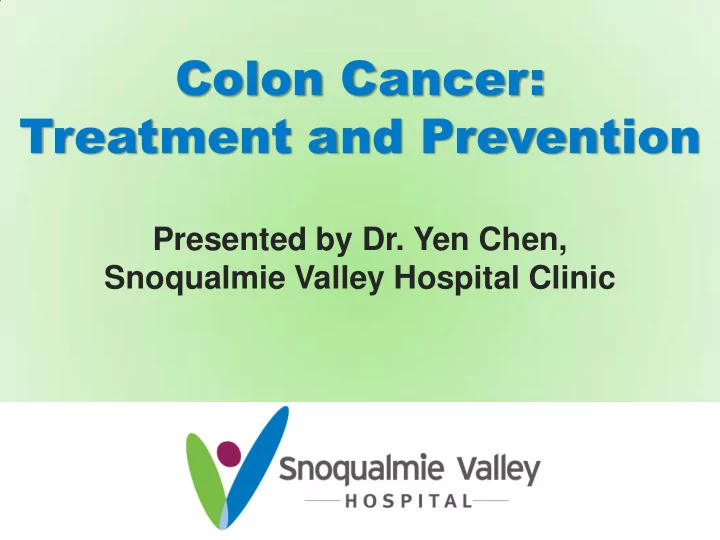

Colon Cancer: Treatment and Prevention Presented by Dr. Yen Chen, Snoqualmie Valley Hospital Clinic
Snoqualmie Valley Hospital Endoscopy & Colonoscopy Team From left: Mei, Diane, Karen, Marilu, Tami, Deborah, Dr. Chen Front row: Niki, Jen, Lindsey
COLONOSCOPY PROCEDURE
About Dr. Yen Chen Specialty: Gastroenterology Board Certification: Internal Medicine and Gastroenterology Medical School : Boston University School of Medicine, Boston, MA Internship : Mt. Sinai, New York, NY Residency : Mt. Sinai, New York, NY - 1997 Yen Chen, MD Fellowship : SUNY Health Sciences Center, Brooklyn NY - 1990
Presentation Topics • Colon Cancer Facts • Getting Tested • Preventive Strategies • Questions
What is colon cancer? Begins in the colon or rectum ( colorectal cancer ) Usually develops from pre-cancerous changes or growths in the lining of these organs These growths are called polyps
Polyp
How do polyps form? • Polyps arise from a single abnormal cell, or from a group of abnormal cells. • They arise as a result of changes in the normal regulated sequence of cell division, replication, maturation and eventual cell death.
Colon Polyp to Cancer takes about 10-15 years
Why should you be tested? This polyp to cancer sequence is at the basis for the strategy of screening and surveillance.
Types of Colon Cancer IBD 1% Familial Sporadic 15% 80% Hereditary 4%
POLYP
Why talk about it? One of the most preventable cancers! Cancer Death Estimates 2 nd leading cause of cancer Prostate deaths 28,900 Breast 3 rd most common cancer in 39,800 men and women Lung Colon 157,200 57,100
Risk Factors Risk increases with age Nearly 90% of colon cancer patients are over the age of 50. Other risk factors include: • family or personal history of colon cancer or polyps • chronic inflammatory bowel disease • hereditary colorectal syndromes • use of cigarettes and other tobacco products • high-fat/low fiber diet • physical inactivity
Symptoms Early colon cancer usually has no symptoms Signs and symptoms typically occur only in advanced colon cancer. Symptoms may include: Change in bowel habits lasting more than a few days Bleeding from the rectum Blood in the stool Cramping or gnawing stomach pains Weakness and fatigue Jaundice (yellow-green color of the skin & white part of the eye)
Why get tested? Get the test. Get the polyp. Get the cure. Testing can help detect pre-cancerous polyps Removing the polyp early may prevent it from becoming cancer Since some colon cancers can not be prevented, finding them early is the best way to improve the chance of a cure. 90% survival rate if caught early
Benefits of Screening Five-Year Relative Survival Rates for Colorectal Cancer by Stage at Diagnosis, 1995-2000 90 80 70 60 50 40 30 20 10 0 Localized Regional Distant
Who should get tested? American Cancer Society recommends that all average risk women and men begin regular colon cancer early detection testing at age 50.
Colon Cancer Tests Get the test. Get the polyp. Get the cure. Fecal occult blood testing (FOBT) Barium enema Flexible sigmoidoscopy Colonoscopy Virtual Colonoscopy
Fecal Immunochemical Test PROS CONS • No direct risk • Misses many • No bowel prep cancers & polyps • No change pre-test diet • False positives • Done at home • Done annually • May need a colonoscopy
CT COLONOGRAPHY PROS CONS • No sedation • Miss small polyps • Done every 5 years • Bowel prep needed • Can see entire • False positives • Cannot remove colon polyps • Colonoscopy may be needed
Colonoscopy
Colonoscopy Advantages Limitations • Detects >90% polyps • Risks and cancer • Availability • Provides diagnosis • Cost and therapy • Medicare covers • Compliance average-risk
COLONOSCOPY PROS CONS • See entire colon • Miss small polyps • Remove polyps • Need prep • Done every 5-10 • Sedation years • Miss work • Complications
Instruments Used in Colonoscopy
Polypectomy Technique
Colon Cancer Testing Is EFFECTIVE!!
Are people getting tested? Testing rates remain far too low • One-third of eligible adults in the United States have not been screened for colorectal cancer. • Because of low testing rates, only 39% of colorectal cancers are detected at the earliest, most treatable stage.
Why aren’t people getting tested? Don’t wait for your doctor The most common reason people give for not being tested: “My doctor never talked to me about it!”
Colon Cancer Tests Average Risk
Average Risk Individuals No Symptoms Age 50 No risk factors
Current Recommendations Average Risk Test Interval (years) FOBT Yearly Sigmoidoscopy Every 5 FOBT + Sigmoidoscopy Yearly, every 5 Colonoscopy Every 10* Barium enema Every 5 *Preferred strategy by ACG
Approach to Colon Cancer Testing Asymptomatic Men and Women Age 50 yr Age < 50 yr No family Hx NO family Hx YES family Hx No Screening Average Screening 2 or more first-degree or 1 first-degree HNPCC or FAP 60 yrs 1 first-degree < 60 yrs Average-risk Colonoscopy every Genetic Counseling screening, 5 years, starting age 40 starting age 40
Reduce Your Risk Choices for good health Follow testing guidelines Know your family history Get regular exercise Do not smoke or use other tobacco products Avoid excessive alcohol consumption
Reduce Your Risk Choices for good health Eat 5 or more servings of fruits & vegetables a day Choose whole grain foods Limit your intake of red meat Maintain a healthy weight
Prevent Colon Cancer Smart steps Talk to your doctor Get tested starting at age 50 Encourage your friends, family, and co-workers to get tested Maintain a healthy lifestyle
Schedule An Appointment To schedule a colonoscopy or an appointment with Dr. Chen, call 425-831-3525. Procedures at Snoqualmie Valley Hospital.
Recommend
More recommend